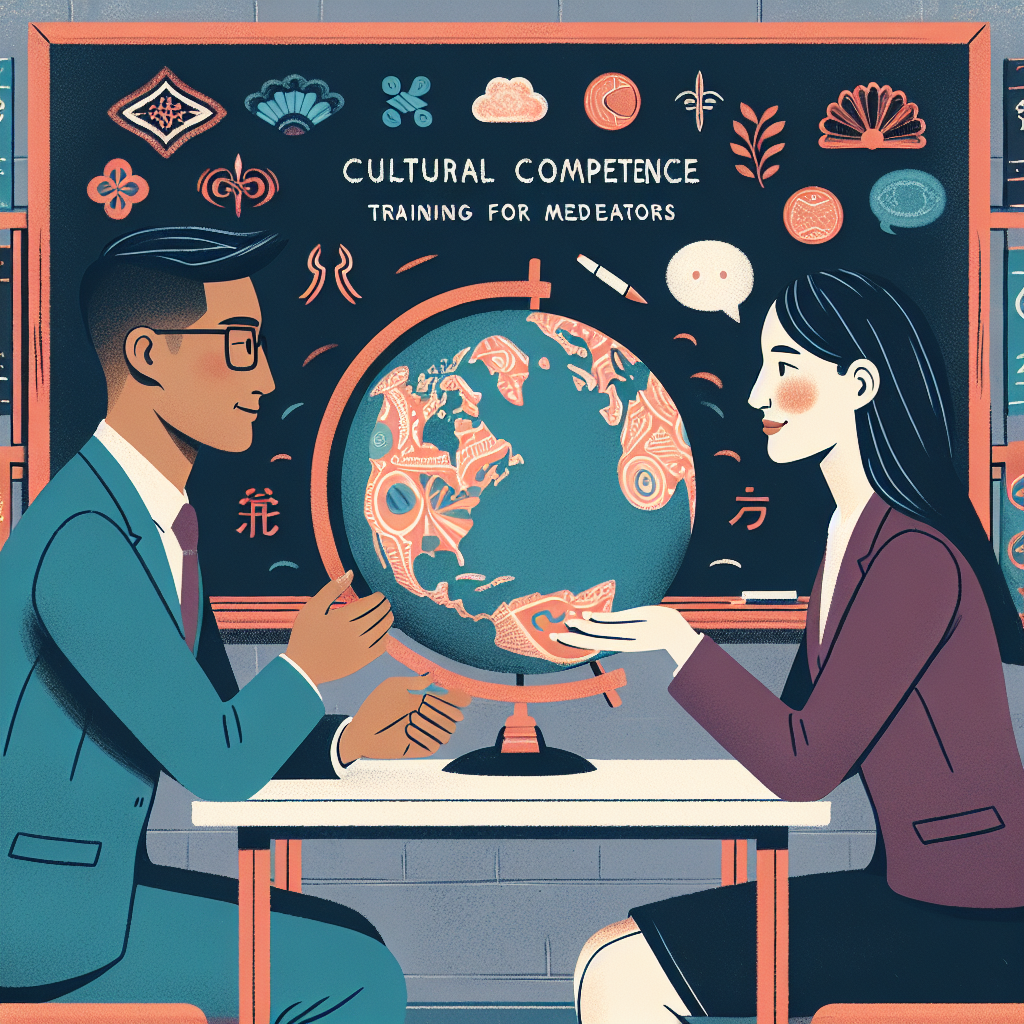Cultural Competence Training for Mediators

Mastering Cultural Competence: Mediator Training
Introduction
Becoming a culturally competent mediator is essential in today’s diverse society. As someone who facilitates communication and resolution between parties with different backgrounds and beliefs, it is crucial to have a deep understanding and appreciation of cultural differences. In this article, we will explore the definition of cultural competence, its importance in mediation, and the benefits of cultural competence training for mediators.
Definition of Cultural Competence
Cultural competence is the ability to effectively interact and mediate conflicts between individuals from different cultures. It involves understanding the dynamic influences of culture on perspectives, communication styles, and behaviors, and being able to navigate these differences in a respectful and inclusive manner.
In the context of mediation, cultural competence means having the skills, knowledge, and awareness to address cultural differences and effectively facilitate communication and resolution between parties from diverse backgrounds. This includes recognizing and respecting cultural values, beliefs, and practices, and being sensitive to how they may impact the mediation process.
Benefits of Cultural Competence Training for Mediators
Cultural competence training is an essential aspect of mediator development. It can improve the quality and effectiveness of the mediation process in many ways, including:
- Enhancing communication between parties from different cultures
- Creating a more inclusive and welcoming environment for all parties
- Minimizing misunderstandings and conflicts due to cultural differences
- Promoting mutual understanding and respect
- Improving the chances of reaching a fair and satisfactory resolution
With proper training, mediators can effectively navigate through cultural differences and facilitate a more successful mediation process for all parties involved.
Understanding Cultural Differences
One of the key components of cultural competence is being able to understand and appreciate cultural differences. Mediators must recognize that each individual has unique cultural backgrounds, values, and beliefs that shape their perspectives and behaviors.
To be culturally competent, mediators must take the time to learn and understand the cultural backgrounds of the parties involved. This may include their cultural values, beliefs, communication styles, and potential biases or stereotypes that may impact the mediation process. By doing so, mediators can better navigate through these differences and create a more inclusive and respectful environment for all parties.
Communication Skills in Cultural Competence
Effective communication is crucial in mediation, especially when dealing with parties from different cultures. Mediators must have strong communication skills to bridge potential language and cultural barriers and facilitate understanding between parties.
Some essential communication skills for mediators to have in cultural competence include active listening, asking open-ended questions, and using neutral and non-judgmental language. These techniques can help mediators build rapport and trust with parties from diverse cultures and promote effective communication and understanding throughout the mediation process.
Addressing Bias and Stereotypes
It is essential for mediators to recognize and address their own biases and stereotypes when mediating conflicts between parties from different cultures. Unconscious biases can significantly impact the mediation process and create barriers to understanding and resolution.
Cultural competence training can help mediators become more aware of their biases and provide strategies to mitigate their effects. By acknowledging and addressing any biases or stereotypes, mediators can create a more inclusive and unbiased mediation process for all parties involved.
Building Trust and Rapport
Building trust and rapport with parties from different cultures is crucial for a successful mediation process. Mediators must establish a safe and respectful environment where all parties feel heard and valued.
One way to build trust and rapport with parties from diverse cultures is by demonstrating cultural sensitivity and respect. This can include using inclusive language, acknowledging cultural differences, and showing a willingness to learn and understand the perspectives of all parties involved.
Culturally Sensitive Problem-Solving
In mediation, finding a resolution that is culturally sensitive and acceptable to all parties is crucial. Mediators must be skilled in identifying and addressing cultural differences and finding solutions that respect and honor these differences.
One effective approach to culturally sensitive problem-solving is to involve all parties in the decision-making process. This can help ensure that the outcome is culturally appropriate and acceptable to all parties.
Cultural Considerations in Conflict Resolution
It is essential to recognize that cultural values and beliefs can significantly impact conflict resolution. For example, some cultures may prioritize individual needs and desires, while others may prioritize group harmony and consensus.
Mediators must be aware of these cultural considerations and adapt their approach to conflict resolution accordingly. By understanding and considering cultural values and beliefs, mediators can effectively navigate through potential barriers and facilitate a more successful resolution.
Implementing Cultural Competence into Mediation Practice
To truly become culturally competent mediators, it is crucial to incorporate cultural competence into everyday mediation practice. This can include:
- Continuing education and training on cultural competence
- Developing a deeper understanding of different cultures and their impact on conflict resolution
- Practicing active listening and effective communication techniques
- Being aware of and addressing personal biases and stereotypes
- Continuously striving to create an inclusive and respectful environment for all parties
By incorporating cultural competence into mediation practice, mediators can foster a more inclusive and effective mediation process for parties from diverse cultures.
Conclusion
Cultural competence is crucial for mediators to effectively facilitate communication and resolution between parties with different cultural backgrounds. It involves understanding and appreciating cultural differences, effective communication skills, addressing biases and stereotypes, and finding culturally sensitive solutions. By continuously developing and incorporating cultural competence into mediation practice, mediators can promote a more inclusive and successful mediation process for parties from all backgrounds.



